Compact Unit
 |
HEALTH DAY: FOCUS ON |  |
 |
||
Sunday, January 29, 2012
Guest Writer for This Unit: CaTrice B. Glenn is an ordained Baptist minister, Licensed Professional Counselor, and a pastoral counseling doctoral candidate at Candler School of Theology, Emory University, Atlanta, GA.
The unit you are viewing, Health Day: Focus on Mental Health, is a compact unit. This means that it is not a complete commentary of the Scripture(s) selected for this day on the calendar, nor does it have a full, supporting cultural resource unit and worship unit. Instead, to enliven the imagination of preachers and teachers, we have provided a sermonic outline, songs, suggested books, and suggested articles, links, and videos. 2011 was the first year that the African American Lectionary posted compact units for moments on its liturgical calendar.
I. Description of the Liturgical Moment

Health Day is the Church’s opportunity to celebrate and advocate for healthy lifestyles. Healthy living involves unified wellness of the body, mind, and soul. May is National Mental Health Awareness month, but mental health is such as important subject that even if churches do not focus on it in May, they should focus on it at some point during the liturgical year. The national recognition of mental health highlights the significance of mental illness in our country and the continual need to advocate for those who struggle with various mental impairments.
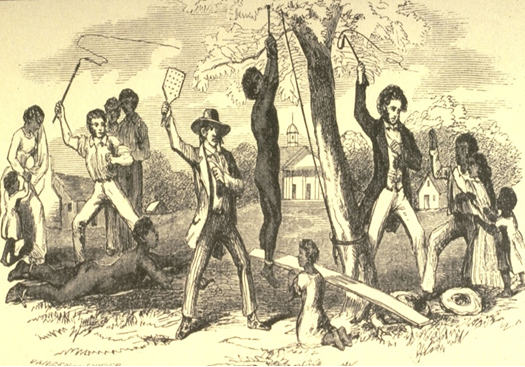
As an ethnic group, Americans of African descent have had to endure extreme mental attacks in the forms of racism, oppression, systemic discrimination, and for some a constant experience of scarcity. Yet, as a culture, we are a resilient people, able to withstand much against incredible odds. However, that notion of resiliency may come with a price. Some of us have challenges that negatively affect how we see the world and how we relate to others in the world. When those challenges arise, it becomes important to seek first the source of all healing and second to engage the healing vehicles that God provides for our recovery.
In general, African Americans have always relied on God’s healing for relief from whatever ailed us. Whether through prayer and fasting, altar calls, mourner’s benches, laying on of hands, or anointing of oil, we have beseeched God’s direct intervention in our lives when we experience sickness or “dis-ease.” As God continues to reveal how God is operating in the world, we began to recognize that God’s healing can also come in the form of treatments, medicine, and lifestyle changes.
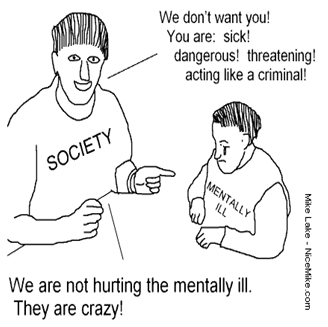
Today, we are challenged yet again to expand our vision to see God’s process of healing continually as it relates to mental illness. Just as we would not tell a person with diabetes or hypertension to ignore the warning signs of illness, we should not discourage persons who struggle with thoughts, emotions, or behavioral challenges against seeking God’s healing through therapy and treatments.
Further, as therapy and treatment are discussed, more must be done by the Church to ensure that persons of African descent get the care they need. Margaret Stout, Chair of the board of directors of the National Association of Mental Illness (NAMI), wrote:
With this material as our backdrop, we provide a sermonic outline for Health Day (Focus on Mental Health).
II. Health Day (Focus on Mental Health): Sermonic Outline
A. Sermonic Focus Text(s): Matthew 4:23-25 (New Revised Standard Version)
(v. 23) Jesus went throughout Galilee, teaching in their synagogues and proclaiming the good news of the kingdom and curing every disease and every sickness among the people. (v. 24) So his fame spread throughout all Syria, and they brought to him all the sick, those who were afflicted with various diseases and pains, demoniacs, epileptics, and paralytics, and he cured them. (v. 25) And great crowds followed him from Galilee, the Decapolis, Jerusalem, Judea, and from beyond the Jordan.
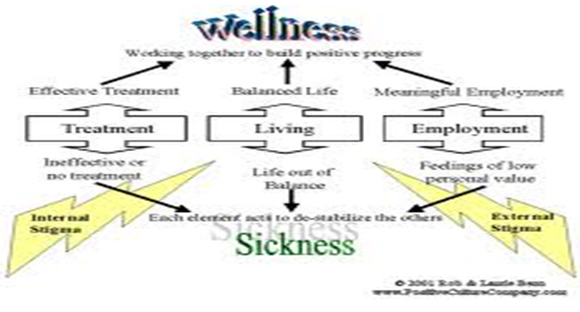
B. Possible Titles
ii. God Cares
iii. Made in Christ’s ImageC. Point of Exegetical Inquiry
In any text there can be several words or phrases that require exegetical inquiry. One exegetical question raised by this text is the term demon-possessed. In verse 24 of Matthew 4, the text says that people of diverse or varied sicknesses and diseases where brought to Jesus for healing, including those who were demon-possessed. The Greek word “Daimonizomai” is interpreted ‘demon possessed’ in this text. The concept of demon possession appears several times throughout the Gospels (e.g. Matthew 12:22, 15:22; Mark 1:32, 5:15 f; John 10:21), but here in verse 24, it is used specifically to note individuals who were considered to have their minds inhabited by demons, having no self-control and being fully operated and led by evil forces. The early Christian church would have used the term demon-possessed to describe a number of ailments and conditions including certain experiences of mental illness.
According to Thayer’s Greek Lexicon, as far back as 500 A.D. authors such as Philemon in Stobaeus expanded the interpretation of ‘demon possession’ to include those who were considered ‘insane.’ Later authors linked demon possession with persons afflicted by severe diseases either physical or mental. These persons were believed, by the Jews, to have had their bodies and minds exploited by demonic forces. Therefore, leaders of the faith attempted to cure the demonic affliction by expulsion of the demon. What remained, however, was any original illness that preceded the possession. Today modern science and pastoral reflection recognize many contributing factors to mental illness. Some individuals are genetically pre-disposed to certain illnesses while others have been reared in challenging environments or under certain conditions that significantly influence how they operate in the world. While a part of the Church’s role is still to aid persons who acknowledge the absence of God in their life (a different perspective of demon possession), perhaps more attention should be given to acknowledging where God exists in our lives. This focus will readjust how mental illness is seen in the Church and replace the demonizing views that have taken place for centuries. Since God created all humans in God’s image, those who suffer with mental illness reflect some aspect of God’s image as well. Perhaps the most beneficial thing that the Church can offer persons with mental illness is a loving community that helps them to see themselves in Christ’s image and plan for the world.
III. Introduction
In our text, we find Jesus traveling throughout Galilee, teaching and preaching the good news of the Kingdom. As he traveled through, many began to recognize that God was with him and that he had God’s gift of healing. People from all around began bringing their ill and wounded loved ones to Jesus, and Jesus healed them all regardless of their illness. In doing so, Jesus demonstrated God’s love and care for all who would come to God with their needs.
Emmanuel Lartey, in his book In Living Color, builds on the axiom that in some ways we are all “like all others, like some others and like no other.” In essence, no human can escape all of the ails that beset humanity. Each of us has our own set of unique gifts and challenges, but the gifts and challenges present in our lives in some respect mirror the gifts and challenges in others. Though we may not share the woes of everyone we encounter, some aspect of ourselves can identify with or be reflected in each person we encounter. Therefore, to hold another in distain is to hold an aspect of ourselves in disdain, and to judge or discriminate against another is to judge or discriminate against an aspect of ourselves. Though it is hard to conceptualize, we all share aspects of ourselves that are similar to a mentally healthy person and a mentally unhealthy person. We each have the potential to be both caring and hurtful, benevolent and dangerous, sane and insane.
Individuals who suffer with unmanageable behaviors, thoughts, and emotions experience significant “dis-ease.” Having a disease differs from being “unwell.” In life, each of us will encounter times when we do not feel well. When sudden transitions happen or chaotic events occur, many of us might experience feeling off-kilter or not well, but this differs from being in a continual state that interferes with the way we function in the world. Dis-ease, which is the debilitating experience of being not at ease in the world, can cause one’s life to appear absent of God’s presence, particularly if we struggle to see where God is at work in our lives. Instead of calling these struggles ‘weakness’ or labeling them as ‘a lack of faith,’ we as others made in Christ’s image need to begin seeing our encounters with these persons as opportunities to encourage and demonstrate Christ’s love. These encounters become opportunities to empower rather than to correct or redirect.
IV. Moves/Points
Move/Point One – Who Makes up the Kingdom?
Jesus came preaching good news about the kingdom having come. As a demonstration of a kingdom mindset, he healed everyone who came to him. This illustration of the Kingdom is all-inclusive and offers hope for those who feel less worthy.
a. The kingdom that Jesus proclaims is built on God’s love;
b. The kingdom is made of individuals with different gifts and challenges—many members;
c. How did Jesus treat those with illness/infirmities?
Move/Point Two – Jesus Cares
Jesus stopped what he was doing to heal the sick, diseased, and mentally ill. He did not discriminate, nor did he question or judge the origin of their illness. He provided for their needs. Jesus did not hesitate to make life better.
a. Each child of God is special to Jesus;
b. Jesus sees beyond what the world sees—Jesus sees the heart; and
c. Healing may come immediately or through a process, but Jesus is at work in your life.
Move/Point Three – Make a Healthy Place for All in the Community
The persons healed had support. Someone decided to tell them about Jesus, take them to Jesus, and stand with them while their healing occurred. We have an obligation to those seeking healing to be the light of Christ in the world through encouragement and action. We must embrace those whom Christ embraced.
a. Bear one another’s burdens and demonstrate Christ’s love to those in need;
b. Count our blessings; we are blessed to be a blessing; and
c. Jesus has good news for you too.
V. Challenge
Dimensions of mental illness have plagued humanity since its creation. Whether it was Adam’s inability to accept personal responsibility, Saul’s (Israel’s first King) bi-polar traits, or Judas’s suicidal ideation, all of humanity, including God’s children, has struggled with mental hurdles in life. We as a people have bought into the notion that we can make it on our own without anyone else. Somehow we have confused survival with strength and confused reliance on others with weakness. We have focused so much energy on fighting to prove that we can handle things that we haven’t sought help to make things better. Instead of thriving we settle for surviving, even when God wants to offer us a way out.
We hide our concerns, our challenges, our fears, and our insecurities, all in an effort to ‘handle things on our own.’ Where is God in that?! God told us to cast ALL our cares onto God because God cares for us. God is already aware of everything in our lives, but our refusal to present our cares before God creates a barrier between us and God’s healing.
Mental illness is a sign that something is interfering with how we live our lives. Just like the Apostle Paul had a thorn in his flesh he could not remove, we all have something that hinders us in some way or another. Jesus, the son of God, did not hesitate to heal all those who came or were brought to him, nor did he degrade or devalue anyone who sought healing. We are charged to do the same and to change how we understand mental illness.
Mental illness is not a moral failure. While we may not understand how and why illness enters our life, we who believe in Jesus the Christ know that the appearance of illness is not the end of the story. Philippians 1:4-6 tells us “that He who has begun a good work in you will complete it until the day of Jesus Christ” (KJV). God is not through with us yet.
The same Jesus who endured the pain and agony of the cross walks alongside us as we triumph over all adversity. The same Jesus who died on the cross for our sins knew that we would feel alone at times and feel as if no one understands. That same Jesus sent us a comforter called the Holy Spirit to be our counselor and to reveal all good and perfect truth to us. That same Jesus who was buried in a borrowed tomb and rose on the third day knows what it feels like to experience rebirth after tragedy, healing after sickness, resurrection after death. That same Jesus who now sits at the right hand of God, interceding for us, sees our struggles and stands in the gap for us, even when we want to turn our backs against God. And that same Jesus who is coming again is waiting on that day when our spirits join him in that new Kingdom—where all things are made new and troubles are washed away, where bodies will be at rest and our souls will live forever with our God. Amen.
VI. Illustration(s)
The Watkins ManAs a child I was told that long ago a man used to travel throughout the streets of our neighborhood called The Watkins Man. I never saw him myself but they tell me he had a traveling partner, a large black bag that carried remedies for whatever ailed you. He had lotions, cleaning solutions, and medicines. The most famous item he had was called Watkins Salve. It came in a green tin with a white top on it. People used to rub it on places where they ached. Wherever you rubbed the Watkins Salve you thought healing was taking place because the spot felt warm. You may have never heard of The Watkins Man; that’s unimportant. I came to tell you about another man who also travels door-to-door. This man can fix whatever ails you but he doesn’t carry his cures in a bag. This man is Jesus and His traveling partner is the Holy Spirit. He came over 42 generations ago, with healing for all who were sick. His healing is still available. He is the cure for what ails us.
| —Carmen Avery, Atlanta, Georgia |
This illustration is taken from the Sermon Illustrations section of the African American Lectionary.
VII. Sounds, Sights, and Colors in This Passage
| Sounds: | Crowds; teaching, preaching, and celebrations (as people were healed); |
| Sights: | Crowds of sick people brought to Jesus; miraculous healing; people moving around seeking healing; demoniacs; people shaking due to epilepsy and people unable to move due to paralysis; crowded synagogues; and |
| Colors: | The colors of the clothing worn by demoniacs; the pale tongue of a paralytic; the colors of the foliage in the areas where Jesus healed (Jerusalem, Judea, and Galilee). |
VIII. Songs to Accompany This Sermon
A. Hymns
- No, Not One. By Johnson Oatman, Jr.

- Just as I Am. By Charlotte Elliott. Tune, (JUST AS I AM).

- Come, Ye Disconsolate. By Thomas Moore. Tune, (CONSOLATOR), by Samuel Webb

B. Modern Song(s) (Written between 2005–2011)
- He’s Concerned. By CeCe Winans

- Moving Forward. By Israel Houghton

- Never Would Have Made It. By Marvin Sapp
- Can’t Nobody Do Me Like Jesus. By James Cleveland
- Listen. By Adrian Anderson
- Safety. By Oscar Williams
C. Well-known Song(s)
- Bend, Don’t Break. By Richard White
- My Relationship. By James Moore
- Mercy. By Andraé Crouch
D. Spiritual(s)
- Fix Me Jesus. Negro Spiritual. Arr. by Nolan Williams
- Heal Me. By Terry MacAlmon
- Broken for Me. By Janet Lunt
- No, Not One. By Johnson Oatman, Jr.
E. Liturgical Dance or Mime Ministry Music
- For Every Mountain. By Kurt Carr
- Never Be Bound Again. By Paul S. Morton
F. Invitational Song(s)
- I Want Jesus to Walk with Me. Negro Spiritual. Arr. by Nolan Williams, Jr.

- Precious Lord, Take My Hand. By Thomas A. Dorsey

IX. Videos, Audio, and/or Interactive Media
- Film: The Soloist (2009). Stars: Jamie Foxx, Robert Downey Jr., and Catherine Keener
- Film: A Beautiful Mind (2001). Stars: Russell Crowe, Ed Harris, and Jennifer Connelly
- Clip: Health Conversations: Mental Illness & The Church

- Documentary: Leifman’s History of Mental Illness in America
- The Mental Illness Education Project produces and distributes video-based educational materials. Online location: http://www.miepvideos.org/ accessed 13 September 2011
- The National Alliance on Mental Illness Multicultural Action Center website. Online location:
http://www.nami.org/Template.cfm?Section=Resources&Template=/ContentManagement/ContentDisplay.cfm&ContentID=21024 accessed 13 September 2011
- African American Mental Health Statistics by the U.S. Department of Health & Human Services. Online location:
http://minorityhealth.hhs.gov/templates/content.aspx?lvl=3&lvlID=9&ID=6474 accessed 13 September 2011.
X. Books to Assist in Preparing Sermons or Related Bible Studies for Health Day: (Focus on Mental Health)
 |
Oates, Wayne E. The Christian Pastor. Louisville, KY: Westminster John Knox Press, 1982.
|
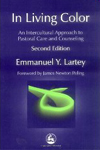 |
Lartey, Emmanuel Y. In Living Color: An Intercultural Approach to Pastoral Care and Counseling. Philadelphia, PA: Jessica Kingsley Publishers, 2003.
|
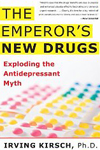 |
Kirsch, Irving. The Emperor’s New Drugs: Exploding the Antidepressant Myth. New York, NY: Basic Books, 2011.
|
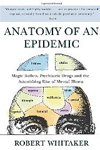 |
Whitaker, Robert. Anatomy of an Epidemic: Magic Bullets, Psychiatric Drugs, and the Astonishing Rise of Mental Illness in America. New York, NY: Crown Books, 2011. |
 |
Taylor, Robert Joseph, Linda M. Chatters, and Jeff Levin. Religion in the Lives of African Americans: Social, Psychological, and Health Perspectives. Thousand Oaks, CA: Sage Publications, Inc., 2003. |
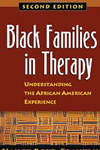 |
Boyd-Franklin, Nancy. Black Families in Therapy: Understanding the African American Experiences. New York, NY: The Guilford Press, 2006. |
 |
Hill, Nancy, Tammy Mann, and Hiram Fitzgerald. African American Children and Mental Health. Santa Barbara, CA: Praeger, 2011. |
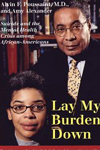 |
Poussaint, Alvin F. Lay My Burden Down: Suicide and the Mental Health Crisis Among African-Americans. Boston, MA: Beacon Press, 2001. |
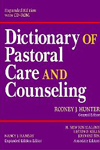 |
Hunter, Rodney and Nancy Ramsay. Dictionary of Pastoral Care and Counseling. Nashville, TN: Abingdon Press, 2005. |
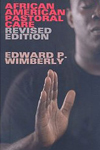 |
Wimberly, Edward P. African American Pastoral Care, Revised Edition. Nashville, TN: Abingdon Press, 2008. |
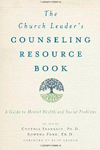 |
Franklin, Cynthia and Rowena Fong. The Church Leader’s Counseling Resource Book: A Guide to Mental Health and Social Problems. New York, NY: Oxford University Press, 2011. |
 |
Stanford, Matthew S. Grace for the Afflicted: Viewing Mental Illness Through the Eyes of Faith. Colorado Springs, CO: Biblica, 2008. |
XI. Links to Helpful Websites
- Resources: African American Mental Health and the Church. Online location:
http://www.nami.org/Template.cfm?Section=Resources&Template=/ContentManagement/ContentDisplay.cfm&ContentID=21024
- Glossary of Mental Health Terms. Online location:
http://www.apa.org/research/action/glossary.aspx
- Understanding Types of Therapy. Online location:
http://therapists.psychologytoday.com/rms/content/therapy_methods.html
- Article: Mental Health in the African American Community. Online location:
http://www.healthyminds.org/More-Info-For/African-Americans.aspx
- Brochure: Mental Health in the African American Community. Online location:
http://www.psychiatry.org/mental-health/people/african-americans
- An Interview with Gerald Syrkett regarding the African American Mental Health Initiative. Online location:
http://www.youtube.com/watch?v=8YWTY1R3v48&feature=related
- A clip by the Anti-Stigma Project by The Behavioral Health and Recovery Services Division of San Mateo County California. Online location: http://www.youtube.com/watch?v=ZJQJ5Hkx4rY
- Mental Health Matter: “A Personal Story of Wellness and Recovery,” by Kenneth Davis, a member of Black Men Speak! Online location: http://www.youtube.com/watch?v=CT6rGRB1ZeM&feature=related
- Comments with Dr. James Haney Presents, Status of Mental Health in America (Part one) with Dr. Poe.
Online location: http://www.youtube.com/watch?v=NW9S2wcnGMw&feature=related
- Comments with Dr. James Haney Presents, Status of Mental Health in America (Part two) with Dr. Poe.
Online location: http://www.youtube.com/watch?v=i_1K4TqxvuY&feature=related
XII. Notes for Select Songs
A. Hymns
- No, Not One. By Johnson Oatman, Jr.
Location:
African American Heritage Hymnal. Chicago, IL: GIA Publications, 2011. #308
- Just as I Am. By Charlotte Elliott. Tune, (JUST AS I AM).
Location:
African American Heritage Hymnal. #344
- Come, Ye Disconsolate. Text by Thomas Moore. Tune, (CONSOLATOR), by Samuel Webb
Location:
African American Heritage Hymnal. #421
B. Modern Song(s) (Written between 2005–2011)
- He’s Concerned. By CeCe Winans
Location:
Songs of Emotional Healing. Brentwood, TN: EMI Gospel, 2010
- Moving Forward. By Israel Houghton
Location:
The Power of One. New York, NY: Sony, 2009.
- Never Would Have Made It. By Marvin Sapp
Location:
Thirsty. New York, NY: Verity, 2007.
- Can’t Nobody Do Me Like Jesus. By James Cleveland
Location:
Original Gospel Classics: The Reverend James Cleveland. Jackson, MS: Malaco Records, 2006.
- Listen. By Adrian Anderson
Location:
Trin-i-tee 5:7. T57 Deluxe Edition. Houston, TX: Music World, 2008.
- Safety. By Oscar Williams
Location:
Williams, Oscar and Perfected Praise. Unstoppable. Indianapolis, IN: Aleho, 2005.
C. Well-known Song(s)
- Bend Don’t Break. By Richard White
Location:
GMWA Mass Choir. Gospel Greats. Nashville, TN: Benson Music Group, 1995.
- My Relationship. By James Moore
Location:
Family & Friends—Live in Detroit. Jackson, MS: Malaco Records, 2000.
- Mercy. By Andraé Crouch
Location:
Crouch, Andraé & The Disciples. Mercy. New York, NY: Warner, 1994.
D. Spiritual(s)
- Fix Me Jesus. Negro Spiritual. Arr. By Nolan Williams
Location:
African American Heritage Hymnal. #436
- Heal Me. By Terry MacAlmon
Location:
Zion Still Sings for Every Generation. Nashville, TN: Abingdon Press, 2007. #119
- Broken for Me. By Janet Lunt
Location:
Zion Still Sings. #199
- No, Not One. By Johnson Oatman, Jr.
Location:
African American Heritage Hymnal. #308
E. Liturgical Dance Music
- For Every Mountain. By Kurt Carr
Location:
Kurt Carr Singers. No One Else. Inglewood, CA: Gospocentric, 1997.
- Never Be Bound Again. By Paul S. Morton
Location:
Embracing the Next Dimension. Kissimmee, FL: Tehillah Records, 2008.
F. Invitational Song(s)
- I Want Jesus to Walk with Me. Negro Spiritual. Arr. Nolan Williams, Jr.
Location:
African American Heritage Hymnal. #563
- Precious Lord, Take My Hand. By Thomas A. Dorsey
Location:
African American Heritage Hymnal. #471
Note
1. National Association of Mental Illness, African American Outreach Resource Manual, Preface, 2004.



